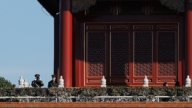【新唐人2012年12月14日讯】中国的微博成了反腐的主战场, 在微博上匿名或实名举报贪官、淫官的例子不胜枚举,官员因此“落马”的也为数不少,中共“十八大”后,10多名受中纪委调查的官员中,超过半数与网路实名举报有关。分析指出,这股网路反腐之风,只是中共不同利益集团之间的互相打击,真正的腐败,中共它根治不了。
近年来,中国民间反腐已从传统的举报、信访等方式,逐渐转为网路实名举报,并形成中共体制外一支重要的反腐力量。
“十八大”后,在中共第五代党魁高调“惩治腐败”的背景下,中国网路反腐更是风生水起,在过去三周,中共中纪委对外公布的落马官员不下11人,包括正厅级官员雷政富、太原市公安局局长李亚力,另外,还有官员涉嫌强奸女主持人、人大代表拥有“4妻10子”等案子,也都来自网路爆料。
11月20号,重庆北碚区委书记雷政富,因微博举报淫乱视频被曝光,23号被免去职务并接受立案调查;11月24号,黑龙江双城市人大代表、双城市工业总公孙司总经理孙德江,被电视台女主持人网路实名举报,说受孙要胁,与他保持不正当关系,随后,孙德江被终止人大代表资格和免去总经理职务;几天后,山东省农业厅副厅长单增德,被情妇公开承诺书,山东省纪委已立案调查。
12月6号,北京的《财经》杂志副主编罗昌平,在他的微博上实名举报国家发改委副主任、国家能源局局长刘铁男,并且详细指控了刘铁男的腐败事实。
中国历史学专家李元华分析,目前网路上刮起的这股反腐之风,实际上是新的班子做出的一个新姿势,借着反腐把政敌打下去。
中国历史学专家李元华:“中共有些领导上来,他要表一个姿态,就说我要反腐,因为新一轮上台,想给人一个新政的形象,所以才要反腐,那个反腐,一个是打一些小鱼小虾,一个是捞取民心,一个是打击政敌。所以真正的腐败,它根治不了。”
“十八大”前后,胡锦涛和习近平在讲话中都警告中共官员:“腐败不除将亡党亡国”。可是,法学与中国问题研究专家赵远明指出,中共政权就是通过纵容官员,在专制下获取额外好处,来维持它的政权。
法学与中国问题研究专家赵远明:“真正的反贪、肃贪、反腐,真正要依靠的,不是党内的这个监督,因为党内监督机构,实际上在中共来说,就是像一个摆设似的,它没有一套的机构,没有依靠的制度,没有一班真正的为老百姓工作,谋福利这么一个工作队伍,但是,老百姓眼睛是亮的,而且老百姓往往是贪腐的直接受害者,他们往往举报的证据也好,资源也好,时间、地点也好,更具体,更可信。”
目前,中国有超过三亿的微博用户,加上网路发酵,媒体跟进,实名微博举报刮起的巨大旋风,已形成中国民间反腐风潮。
李元华指出,今天中共的官员无官不贪,网路举报几十上百,起不到任何作用。
李元华:“对中共不要抱太天真的幻想,觉得它可能要真正的反腐了,因为我们可以看到,每一届中共换届都要做出一些新姿态,但实质上越反,这个腐败越厉害。因为我想这一届也不会有什么太多的,因为中共的体制决定它的专制、独裁、暴政,这是它的本质性的东西,所以本质改不了,那其他的只能是表象的东西。”
不过,赵远明认为,网路反腐是一个新的趋势,至少可以叫那些贪官淫官们再难遁形。
采访编辑/李韵 后制/王明宇
China’s Microblog Enters the Anti-Corruption Battlefield
China microblog has become the main anti-corruption
battlefield, with many corrupt officials being exposed,
and causing some to be dismissed from their jobs.
After the 18th Party Congress, more than 5 out of 10
corrupt officials were reported via the Internet,
and The Central Commission for Discipline Inspection
investigated.
Analysts say, the online anti-corruption campaign
just shows different interest groups fighting each other.
The Chinese Communist Party (CCP) can’t remove
the root of the corruption.
In recent years, China’s civil anti-corruption methods have
changed from traditional ways of reporting and letter-writing
to Internet exposure—the web is playing a powerful role in
fighting corruption outside the CCP’s system.
After the 18th Party Congress, the CCP’s new leaders
made high-profile anti-corruption attempts;
then the Internet campaign of anti-corruption
quickly developed.
In the past three months, the Central Commission for
Discipline Inspection has removed at least 11 corrupt officials
including Lei Zhengfu, Chongqing Party secretary and
Li Yanli, a police chief in Taiyuan City.
Also the suspected rape of a female TV presenter by officials
and the case of a National People’s Congress representative
having 4 wives and 10 sons, were all exposed via the Internet.
On November 20th, Lei Zhengfu’s sex tape was exposed on
a microblog and 3 days later on the 23rd, he was sacked and placed under investigation.
And on November 24th, Sun Dejiang, a National People’s
Congress representative in Shuangcheng City, Heilongjiang, was exposed via the Internet by a TV presenter.
The victim says Sun forced an improper relationship on her—
Sun was later removed from his position.
Some days later, the mistress of Shan Zengde,
deputy director of Shangdong’s agriculture department,
exposed him, placing Shan under criminal investigation.
December 6—Luo Changping, Beijing’s vice editor-in-chief
of Caijing magazine, used his real name to expose Liu Tienan
deputy director of the National Development and Reform
Commission, revealing the details of Liu’s corruption.
Chinese historian Li Yuanhua analyzes that the current
Internet anti-corruption trend is a new behavior carried out by a new class.
[Li Yuanhua, Chinese Historian]: “There are some CCP leaders
stepping up; wanting to express an attitude and position.
They always say ‘I want to combat corruption’,
because a new generation stepped up,
wishing to give people an image of a new political system,
so fighting corruption is necessary.
But that “anti-corruption” is on one hand trying to
catch some small fish and shrimps;
on the other hand trying to win over people’s hearts;
and is also attacking political opponents—so it is not able to truly combat corruption.”
Hu Jintao and Xi Jinping has warned CCP officials that
the CCP will cease to exist if corruption is not rid of.
However, Zhao Yuanming, a China problem and
legal expert says,
the CCP maintains its political power by indulging officials
to do whatever they want and by being in cahoots with them;
gaining additional benefits from its dictatorship.
[Zhao yuanming, China Problem and Legal Expert]:
“The true fight against corruption doesn’t rely on supervision
within the CCP—the supervision system within the CCP is
ornamental; it doesn’t have a reliable system.
There isn’t a group of people truly working for the people or
obtaining benefits for the people.
However, the public see clearly and they are often
direct victims of corruption.
The evidence they often report, or reports of resources, time,
and location are more specific and trustworthy.”
Currently, there are over 300-million microblog users—
Internet maturity, media follow-up and the microblog upsurge have shaped the trend of anti-corruption among the public.
Li Yuanhua points out that, there are no CCP officials
who are not corrupt nowadays.
Hundreds-of-thousands of online corruption reports have
not made any significant effect.
[Li Yuanhua, Chinese Historian]: “Don’t hold innocent
dreams of the CCP and don’t feel that maybe it will truly combat corruption.
Because we have seen that with every period of change,
the new leaders express some new attitudes.
But the true nature is that the more they try to combat
corruption, the corruption actually intensifies.
I think this generation also won’t see too much change,
because the CCP system determines its dictatorship,
autocracy and violent political regime nature.
These are the things of its true, original nature,
and its nature can’t be changed;
any change is on the surface,
and just the appearance of things.”
Zhao Yuanming believes that the Internet anti-corruption
is a new trend—it will be hard for corrupt officials to hide.





























